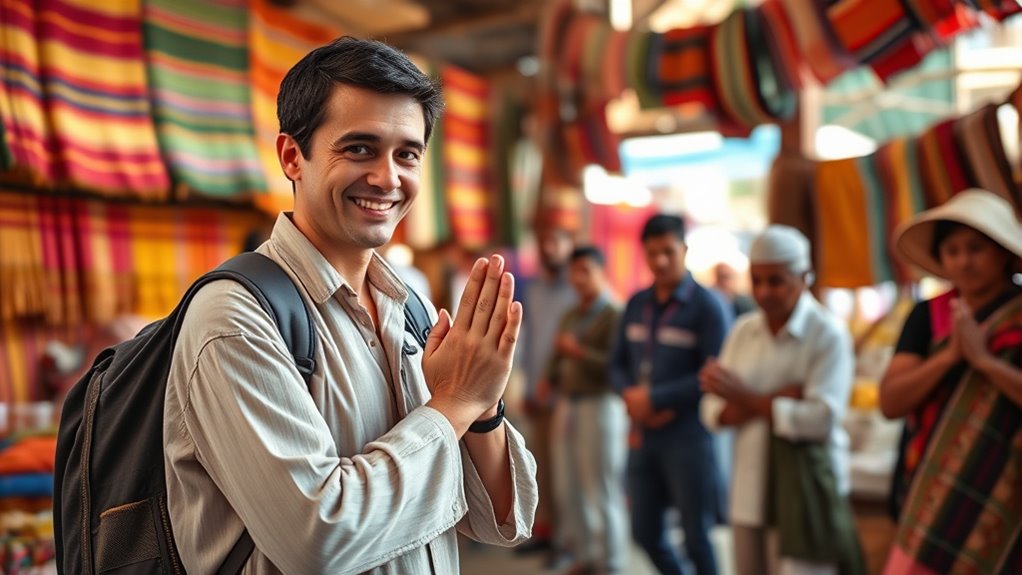To navigate cultural etiquette as a global traveler, start by learning local customs and gestures, like bowing in Japan or handshakes in the West. Respect dining traditions, such as eating with hands or waiting for hosts, and adapt your behavior to suit cultural norms. Showing genuine interest and sensitivity helps build connections and avoids misunderstandings. For a smoother journey and richer interactions, exploring further will reveal even more ways to show respect and embrace local traditions.
Key Takeaways
- Research and familiarize yourself with local customs and social norms before visiting a new country.
- Observe and mirror non-verbal cues like gestures, greetings, and personal space to show cultural sensitivity.
- Follow local dining etiquette, including table manners, sharing practices, and tipping customs.
- Respect cultural traditions and participate appropriately to foster positive interactions.
- Approach cultural differences with openness and adaptability to enhance your travel experience.

When traveling to new countries, understanding and respecting local customs can make your experience more enjoyable and meaningful. One of the most visible ways to connect with a culture is through its traditional gestures. These non-verbal cues can convey respect, friendliness, or even social boundaries, and they vary widely across regions. For example, a simple bow in Japan shows respect, while a handshake might be customary in Western countries. In some Middle Eastern cultures, a gentle touch on the shoulder or a kiss on the cheek can be common greeting gestures. Learning these cues beforehand helps you avoid misunderstandings and shows your genuine interest in the culture. Pay attention to how locals interact—mirroring their gestures subtly can foster a sense of familiarity and respect.
Dining customs are another essential aspect of cultural etiquette that can markedly impact your travel experience. Food often embodies a culture’s history, values, and social norms, so respecting local dining customs demonstrates appreciation and sensitivity. For instance, some countries eat with their hands, like in parts of India or Ethiopia, and trying to follow suit can be seen as respectful. In places like Japan or China, it’s customary to wait for the host to start eating and to show gratitude with a simple “thank you” or a nod. In many Western countries, it’s polite to keep your hands visible and avoid resting elbows on the table, but in others, such as in parts of the Middle East, more relaxed manners are acceptable. Be aware of how food is served and eaten—whether it’s common to share dishes or individual plates—and follow local etiquette to avoid causing offense. Also, remember that tipping practices vary; in some countries, leaving a tip is expected, while in others, it might be considered rude or unnecessary.
Respecting traditional gestures and dining customs is about more than following rules; it’s about honoring the people and traditions that make each culture unique. When you show awareness and adapt your behavior accordingly, you foster mutual respect and genuine connections. This doesn’t mean you have to become a perfect imitator, but making an effort to understand and participate in local customs demonstrates your openness and cultural sensitivity. It can turn ordinary interactions into meaningful exchanges, enriching your journey and leaving a positive impression on those you meet. Ultimately, embracing these customs helps you navigate unfamiliar environments with confidence and grace, making your travels more rewarding and respectful.
Frequently Asked Questions
How Do I Politely Decline a Gift in Different Cultures?
When declining a gift politely, consider the gift giving customs and receiving etiquette of the culture. You can express gratitude first, then gently decline by explaining you’re honored but cannot accept, or suggest an alternative like sharing a future meal. In some cultures, refusing a gift outright may be seen as rude, so use respectful language and a warm tone. Always be sensitive to local customs to maintain good relationships.
What Gestures Are Considered Offensive in Middle Eastern Countries?
Ever wonder which hand gestures might offend in Middle Eastern countries? You should avoid pointing with your index finger, as it’s considered rude, and don’t use the sole of your shoe to gesture or sit with your feet directed at someone—it’s disrespectful. Also, avoid making a “thumbs-up” or “OK” sign, as these can have negative connotations. Always aim for respectful communication by using culturally appropriate hand gestures.
How Should I Dress When Visiting Religious Sites?
When visiting religious sites, you should wear traditional attire or modest clothing to show respect. Opt for clothing that covers shoulders and knees, avoiding tight or revealing outfits. Women might consider scarves to cover their hair if required. Dressing conservatively demonstrates your respect for local customs and helps you blend in respectfully. Always check specific dress codes beforehand to ensure you’re appropriately dressed for the religious site you’re visiting.
Are There Specific Topics to Avoid Discussing in Japan?
When visiting Japan, you should avoid taboo topics like politics, World War II, and historical disputes, as they can offend locals. Steer clear of controversial subjects and focus on positive conversations. People appreciate respectful, light-hearted discussions about culture, food, or travel experiences. By being mindful of these sensitive topics, you show respect and help foster friendly interactions, making your trip more enjoyable and culturally appropriate.
What Is the Appropriate Way to Greet Elders in South Korea?
When greeting elders in South Korea, you should perform a formal bowing to show respect. Use a respectful address like “ajusshi” for middle-aged men or “ajumma” for women if appropriate. Maintain eye contact, speak politely, and keep your posture humble. These gestures demonstrate your respect and understanding of local customs, helping you make a positive impression while embracing South Korea’s cultural etiquette.
Conclusion
Just remember, exploring new cultures is like dancing to a different tune—you’ll stumble, but each step brings you closer to harmony. Embrace the lessons, show genuine respect, and keep an open mind. By honoring local customs, you become a guest not just in places, but in hearts. Like a traveler crossing bridges of understanding, your kindness and curiosity will leave lasting impressions, turning every journey into a story worth telling.










